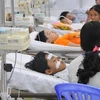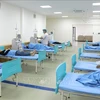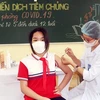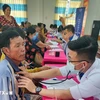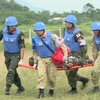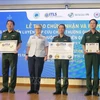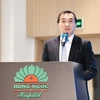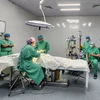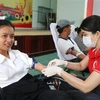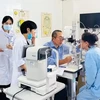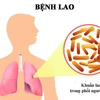There was a shortage of imported vaccines in Vietnam's immunisation services when there was an outbreak of disease, a conference was told in Hanoi last week.
The function was held to gather public and private comments on improving vaccination quality in the country.
Head of the Vietnam Association of Preventive Medicines, Nguyen Tran Hien said that an outbreak of disease caused an increase of market demand that vaccine suppliers could not meet.
Many mothers refused free vaccines that were supplied under the national immunisation programme. They delayed vaccination of their children to wait for imported vaccines.
The World Health Organisation Vietnam warned that by delaying vaccination or failing to follow the recommended national immunisation schedule, parents put their children and the broader community at serious risk of disease.
Hien said that many people prefer to pay for immunisation rather than free vaccines supplied under national programmes. The Health Ministry supplies 12 free vaccines, including those for tuberculosis, diphtheria, polio and whooping cough.
Immunisation services at hospitals and clinics, where people have to pay for their children's vaccines, are considered more convenient and reliable. There are few reports about negative reactions after vaccination of those who used vaccines supplied under national programme.
Hien said that in Vietnam, pharmaceutical companies ordered vaccines from their overseas partners when they felt demand was rising.
"Vaccines can not be stored for long or recycled, so producers only make vaccines as ordered," he said.
"It takes about three months for vaccines to enter Vietnam, causing vaccine shortage at immunisation service during that period."
He said that once an importing company suffered losses after importing vaccine against chicken-pox, but the disease did not break out.
"The company failed to sell chicken-pox vaccines at that time," Hien said, adding this made pharmaceutical companies cautious about importing vaccines.
Nguyen Thi Tuong Vi, a representative of GlaxoSmithKline, a British multinational pharmaceutical company and a vaccine distributor in Vietnam, said that world demand for vaccine 6-in-1 had increased sharply, affecting the supply to Vietnam.
Hospitals and clinics offering immunisation services announced the shortage of 5-in-1 vaccine (against five diseases: polio, whooping cough, diphtheria, tetanus, and Haemophilus influenzae B (Hib)), and 6-in-1 vaccine (for the preceding five diseases plus hepatitis B).
She said that as a vaccine supplier, GlaxoSmithKline gave priority to providing vaccine to nations that it had contracts with for years or to nations using vaccine 6-in-1 as the only vaccine.
Vietnam was not in priority list because vaccine 5-in-1 was included in its national immunisation programme.
Head of the Pharmacy Management Department under the Ministry of Health, Truong Quoc Cuong, said that it was necessary to increase vaccine imports to meet domestic demand.
The department called for administrative simplification to import vaccines.
Representatives from Department of Preventive Medicine under the Ministry of Health said that communication was needed to help people understand more about vaccines provided under the national immunisation programme and immunisation services.
The national programme had a sufficient supply of all vaccines for children aged less than five.
Vietnam expects to make vaccine 5-in-1 and 6-in-1 from 2018 to meet domestic market.
According to WHO, in the last 25 years, vaccines have protected 6.7 million Vietnamese children and prevented 42,000 deaths from childhood diseases such as diphtheria, tetanus, pertussis and polio.-VNA
The function was held to gather public and private comments on improving vaccination quality in the country.
Head of the Vietnam Association of Preventive Medicines, Nguyen Tran Hien said that an outbreak of disease caused an increase of market demand that vaccine suppliers could not meet.
Many mothers refused free vaccines that were supplied under the national immunisation programme. They delayed vaccination of their children to wait for imported vaccines.
The World Health Organisation Vietnam warned that by delaying vaccination or failing to follow the recommended national immunisation schedule, parents put their children and the broader community at serious risk of disease.
Hien said that many people prefer to pay for immunisation rather than free vaccines supplied under national programmes. The Health Ministry supplies 12 free vaccines, including those for tuberculosis, diphtheria, polio and whooping cough.
Immunisation services at hospitals and clinics, where people have to pay for their children's vaccines, are considered more convenient and reliable. There are few reports about negative reactions after vaccination of those who used vaccines supplied under national programme.
Hien said that in Vietnam, pharmaceutical companies ordered vaccines from their overseas partners when they felt demand was rising.
"Vaccines can not be stored for long or recycled, so producers only make vaccines as ordered," he said.
"It takes about three months for vaccines to enter Vietnam, causing vaccine shortage at immunisation service during that period."
He said that once an importing company suffered losses after importing vaccine against chicken-pox, but the disease did not break out.
"The company failed to sell chicken-pox vaccines at that time," Hien said, adding this made pharmaceutical companies cautious about importing vaccines.
Nguyen Thi Tuong Vi, a representative of GlaxoSmithKline, a British multinational pharmaceutical company and a vaccine distributor in Vietnam, said that world demand for vaccine 6-in-1 had increased sharply, affecting the supply to Vietnam.
Hospitals and clinics offering immunisation services announced the shortage of 5-in-1 vaccine (against five diseases: polio, whooping cough, diphtheria, tetanus, and Haemophilus influenzae B (Hib)), and 6-in-1 vaccine (for the preceding five diseases plus hepatitis B).
She said that as a vaccine supplier, GlaxoSmithKline gave priority to providing vaccine to nations that it had contracts with for years or to nations using vaccine 6-in-1 as the only vaccine.
Vietnam was not in priority list because vaccine 5-in-1 was included in its national immunisation programme.
Head of the Pharmacy Management Department under the Ministry of Health, Truong Quoc Cuong, said that it was necessary to increase vaccine imports to meet domestic demand.
The department called for administrative simplification to import vaccines.
Representatives from Department of Preventive Medicine under the Ministry of Health said that communication was needed to help people understand more about vaccines provided under the national immunisation programme and immunisation services.
The national programme had a sufficient supply of all vaccines for children aged less than five.
Vietnam expects to make vaccine 5-in-1 and 6-in-1 from 2018 to meet domestic market.
According to WHO, in the last 25 years, vaccines have protected 6.7 million Vietnamese children and prevented 42,000 deaths from childhood diseases such as diphtheria, tetanus, pertussis and polio.-VNA
